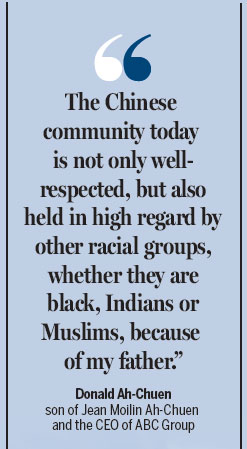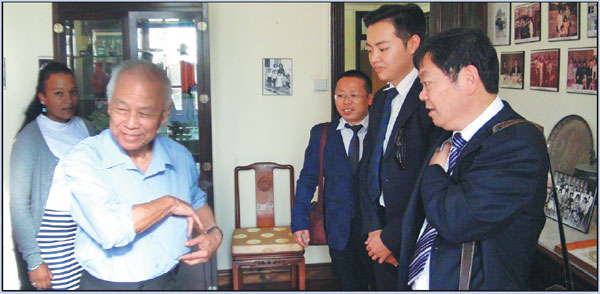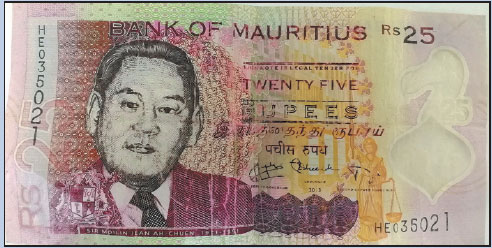ONE CHINESE FAMILY'S LEGACY IN PARADISE
Donald Ah-Chuen, a descendant of Chu Wei Chuen, recalls of his family's contributions to the island nation of Mauritius, Dong Jidong reports in Port Louis, Mauritius
When US writer Mark Twain visited Mauritius in 1896, he quoted a resident on the island saying that "Mauritius was made first and then heaven; and heaven was copied after Mauritius".
The tropical paradise attracted many immigrants from around the world, and among them was 14-year-old Chu Wei Chuen. Born in Meizhou, Guangdong province, the boy's dream was simple - start a business, make a fortune and return home.
He did start a humble grocery business and made a small fortune. But little did he know that he and his future generations would go on to become prominent personalities on the exotic island.
Chu's second son, Jean Moilin Ah-Chuen, went on to become one of the most successful entrepreneurs in Mauritius and the Minister of Local Government after the country became independent in 1968. The Ministry of Local Government is responsible for local government matters in Mauritius. More than a century after his arrival on the island, Chu's eldest granddaughter, Marie Madeleine Lee, become the Mauritian ambassador to China.

Thanks to the precedent set by Jean Moilin and Marie Madeleine Lee, it has become a customary practice that the Cabinet of Mauritius would include a member of Chinese descent and the country's ambassador to China would be an ethnic Chinese, says Donald Ah-Chuen, 84, son of Jean Moilin and the CEO of ABC Group, during an interview in the family's former residence on Reverend Lebrun Street in Rose Hill.
"Our family is very proud of these achievements," Donald says. "It was a great honor for the family when my sister Marie Madeleine met with the then Chinese premier Zhu Rongji in 2000. Zhu was so happy to have an ambassador from an African country who could converse fluently in Mandarin, Cantonese, Hakka and Shanghainese, aside from English and French."
Founded in 1931 by Jean Moilin, the ABC Group is today one of the top 25 conglomerates in the country and employs more than 1,300 people. The company's extensive portfolio includes food, automobiles, banking, insurance, shipping and logistics. And it all started from a humble grocery store in Port Louis called ABC, which stands for Au Bazar Central.
In the 18th century, the period when Mauritius was colonized by French and British settlers, sugar plantations were the country's core industry. Many Indians flocked to the sugar cane farms in the country to work and this soon led to the start of a special relationship between them and the Chinese.
"The sugar planting season lasted only six months, so there was no work for the workers in the other half of the year. But although the workers didn't get paid, the Chinese shopkeepers still supplied them with food for free," says Donald.
In 1942, Jean Moilin became the youngest president of the Mauritian Chinese Chamber of Commerce, and this marked the start of his political career. Under his charge, the chamber later played an important role in providing food to the Chinese community in Mauritius during World War II when Japanese warships and submarines disrupted the food supply to the nation. He also played a pivotal role in rallying the Chinese against Japan.
"Besides rallying overseas Chinese youth to raise funds to help China fend off the Japanese invaders, my father also organized a small group of Chinese shopkeepers to form a defense force for Mauritius. The force, with him as its captain, had a few hundred members," says Donald.
According to the Changsha Evening News, one of the members of this defense force was Lan Binggang, who was in 2015 awarded a medal at a ceremony in China to mark the 70th anniversary of the end of the War of Resistance Against Japanese Aggression (1931-45). The report said that Lan had arrived in Mauritius in 1936 before returning to the Chinese mainland in December 1939 to join the fight against the Japanese invaders.
In recognition of his contributions during the war, Jean Moilin became the first Chinese representative on the Legislative Council in Mauritius in 1948. He continued to climb the ranks in the local government when he was appointed the Minister of Local Government in 1968 after Mauritius became an independent nation. This historic appointment brought much pride to the Chinese community in the country as Sino-Mauritians, most of whom were Hakka, accounted for only 2 percent of the country's population.
One of the notable things that Jean Moilin did was to persuade the Parliament to make the Chinese Spring Festival a public holiday in Mauritius. He succeeded, and Mauritius is today the only African country that celebrates this major Chinese festival.
In 1972, the Mauritian government, in which Jean Moilin held the post of minister, established diplomatic relations with China. In the early 1970s, the slump in sugar cane prices in the international market dealt a heavy blow to the country's economy. As a result, unemployment in the country rose at an alarming rate.
After the Mauritian government passed the Export Processing Zone Act in 1970 to provide incentives for foreign trade, Jean Moilin played a crucial role in building the export processing zone, which led to the creation of more than 60,000 jobs. With the help of his daughter, Madeleine, who was living in Hong Kong with her husband, Jean Moilin also invited delegations of textile entrepreneurs from Hong Kong and Macao to invest in Mauritius.
"Not enough credit has been given to Jean Moilin for the success of the export processing zone. It must be said that it was the zone that saved Mauritius after independence," says Edouard Lim Fat, a close friend of Jean Moilin and one of the pioneers of the zone.
In appreciation of his dedication and contribution to the country, the then prime minister of Mauritius Seewoosagur Ramgoolam recommended Jean Moilin to Queen Elizabeth II of England for the honor of knighthood in 1979. Jean Moilin was made Knight Bachelor of the British Empire in January 1980.
Jean Moilin died in 1991 at the age of 90. In honor of him, his portrait was printed on the 25-rupee banknotes in 1998. Three years later, a commemorative stamp marking the 100th anniversary of his birth was issued in the country.
In her book The Portrait of My Vivid Life, Marie Madeleine Lee paid tribute to her father, writing: "You have unquestionably elevated the status of the Chinese community in Mauritius."
"The Chinese community today is not only well-respected, but also held in high regard by other racial groups, whether they are black, Indians or Muslims, because of my father," said Donald.
The family's old residence on Reverend Lebrun Street was turned into a memorial center and museum for Sir Jean Moilin in August 2009. Donald says that the family members still gather at the site occasionally to relive their growing up days.
Till this day, Jean Moilin's contributions to the country are still an inspiration to many Chinese Mauritians.
"Sino-Mauritians are proud of his dedication to improving the welfare of the community, and the community also serves as a bridge between Mauritius and China," says Jin Lian Qiu, 46, who moved to Mauritius 17 years ago and teaches Chinese at the Royal College Port Louis and Greenwich University Mauritius.
Qiu is currently compiling a Chinese textbook for the Mauritian Ministry of Education and Human Resources.
"I found that great changes have taken place in China when I was attending the World Chinese Language and Culture Education Conference in Beijing in December," she adds.
"China's rapid development makes overseas Chinese very proud. I will play my role as a promoter of Chinese culture in helping more Mauritians better understand China and its culture."
Li Kook Tseung, director of the China Times newspaper in Mauritius and vice-president of the Heen Foh Lee Kwon Society, also spoke of Jean Moilin's impact, saying: "Although we were born in Mauritius, we still have strong ties with China. Chinese-Mauritians prefer to travel to China rather than other places such as Europe and the United States. China is where our heart is."
|
Donald Ah-Chuen shows visitors around the family's former residence on Reverend Lebrun Street in Rose Hill, now a memorial center for his late father Sir Jean Moilin. Photos By Dong Jidong and provided to China Daily |
|
In honor of his contribution, Sir Jean Moilin's portrait was printed on the 25-rupee banknotes in 1998. |
 The family settled in the island nation in the late 19th century. |
(China Daily 07/21/2018 page20)










